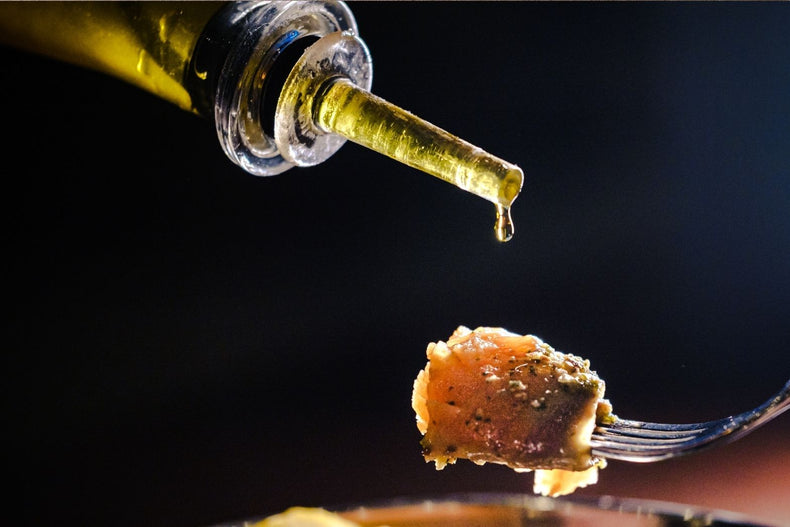What's the Difference Between Olive Oil and Extra Virgin Olive Oil?
by Victoria Glass

Olive oil is a staple in kitchens worldwide, prized for its health benefits, culinary applications, and deep roots in Mediterranean culture. But with shop shelves groaning with different bottles and tins, it can be tricky to work out which olive oil to buy and that’s before we’ve even broached the really big question: what’s the difference between olive oil and “extra virgin” olive oil anyway?
Are olive oil and extra virgin olive oil the same?
Simply put, no. While both originate from the humble olive, the distinction lies in the production process, flavour, growing region, and quality:
- Extra Virgin Olive Oil (EVOO): Represents the highest quality of olive oil. It's made by cold pressing freshly harvested olives without using heat or chemicals. This process retains the purest flavours and aromas, capturing the essence of the olive. EVOO is free from defects, has a free acidity level of less than or equal to 0.8%, and, if stored correctly, possesses superior taste and aroma.
- Regular Olive Oil (or Pure Olive Oil): This is a blend of cold-pressed and processed oils. Once the cold-pressed extraction (responsible for EVOO) is complete, there are residual oils left in the olive. These are extracted using heat and solvents. The resultant oil is then refined to remove impurities, after which a portion of virgin olive oil is mixed back in for flavour.

What are the differences when cooking?
-
Flavour Profile: EVOO has a pronounced olive flavour, which can range from grassy and peppery to fruity. Regular olive oil, being more refined, has a more neutral taste.
-
Smoke Point: Regular olive oil has a higher smoke point than EVOO, making it more suitable for high-temperature cooking, like frying. EVOO's lower smoke point is more suited to gentler cooking, or for using raw to drizzle over dishes, or to dip bread in at the table.
-
Price Point: Due to its premium quality and production process, EVOO tends to be more expensive than its regular counterpart.
What is extra virgin olive oil best for?
-
Salad Dressings: The rich flavour of EVOO shines in vinaigrettes and dressings.
-
Finishing: Drizzle over finished dishes, like soups, pastas, and bruschetta, to enhance flavour.
-
Baking: Its fruity undertones can complement luxury baked goods wonderfully – an olive oil and Vin Santo cake is a thing of beauty.
-
Dipping: it’s the classic choice for dipping bread at the table. You can experiment with extra virgin olive oils from different regions.
-
Low to Medium Heat Cooking: Suitable for sautéing or gentle frying where its flavours can be appreciated.
What is regular olive oil best for?
- High Heat Cooking: Thanks to its higher smoke point, it's ideal for frying, sautéing, and even deep frying.
- Roasting and Grilling: Provides a protective coat to foods without overwhelming them with strong olive flavours.
- Baking: With its neutral profile, it won’t overshadow other ingredients in baked goods.
Which olive oil is the healthiest?
Nutritionally, both oils offer heart-healthy monounsaturated fats. However, EVOO takes the crown for several reasons:
- Antioxidants: EVOO boasts a higher concentration of antioxidants, specifically polyphenols and tocopherols, which combat oxidative stress in the body.
- Vitamin E: Present in higher amounts in EVOO.
- Anti-inflammatory Compounds: EVOO contains oleocanthal, a compound noted for its anti-inflammatory properties.
- Less Processing: EVOO, being less refined, retains more of its natural nutrients and compounds beneficial to health.
Both extra virgin and regular olive oil have unique characteristics making them suited for specific culinary uses. EVOO’s health benefits are well documented and its intense and flavour and fragrance shine best in raw or gently cooked dishes Regular olive oil is the go-to for high-heat cooking or for when a more neutral flavour is needed, such as in homemade aioli or simple baked muffins. Whichever you choose, there’s no denying that incorporating olive oil into your diet is both delicious and good for you.

About the author
Victoria Glass is a London based writer and recipe developer. She has written six cookbooks, including Too Good To Waste and has contributed to various print and online media including The Sunday Times, Great British Chefs, Delicious. Magazine, Women’s Health and The Evening Standard. She has been featured regularly on regional BBC Radio as a food and drink expert and was Food Writer in Residence at the Roald Dahl Museum and Story Centre. Victoria once cooked her way through the alphabet in a year for a project called Alphabet Soup, so she certainly knows her artichokes from her elbow.


